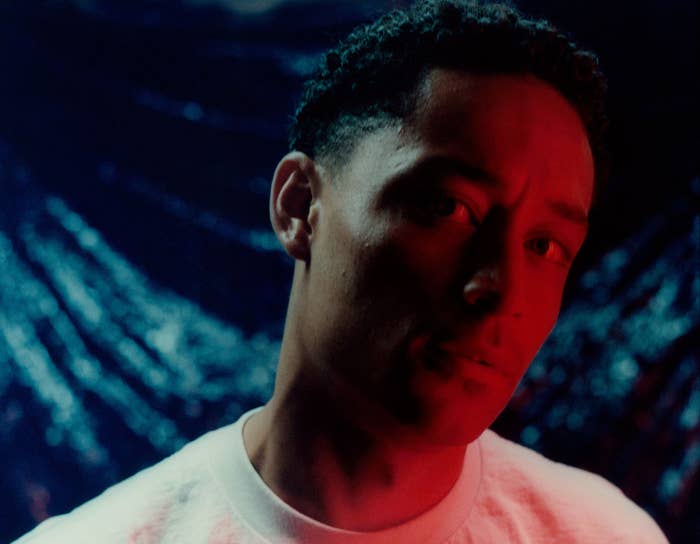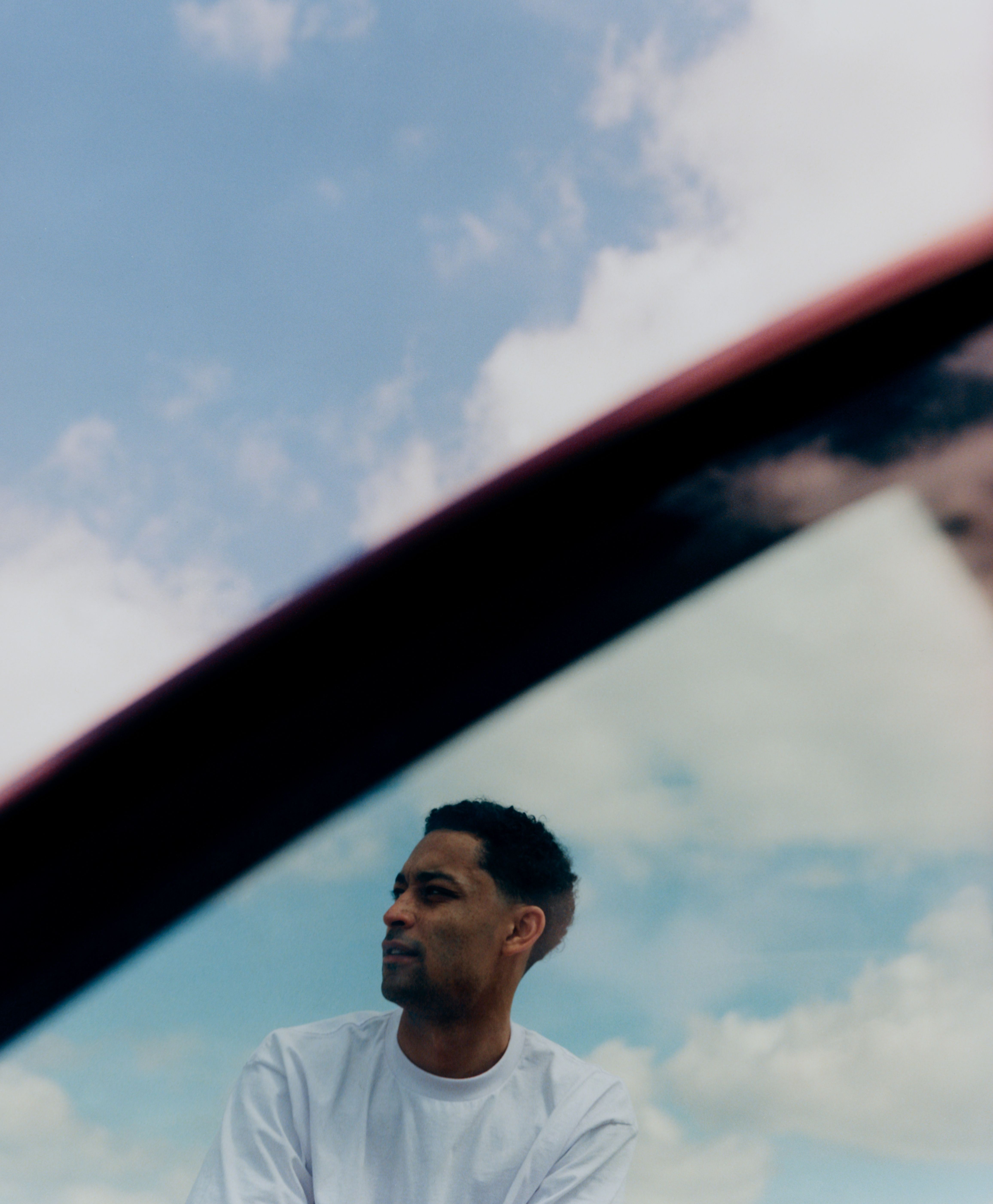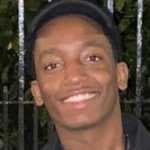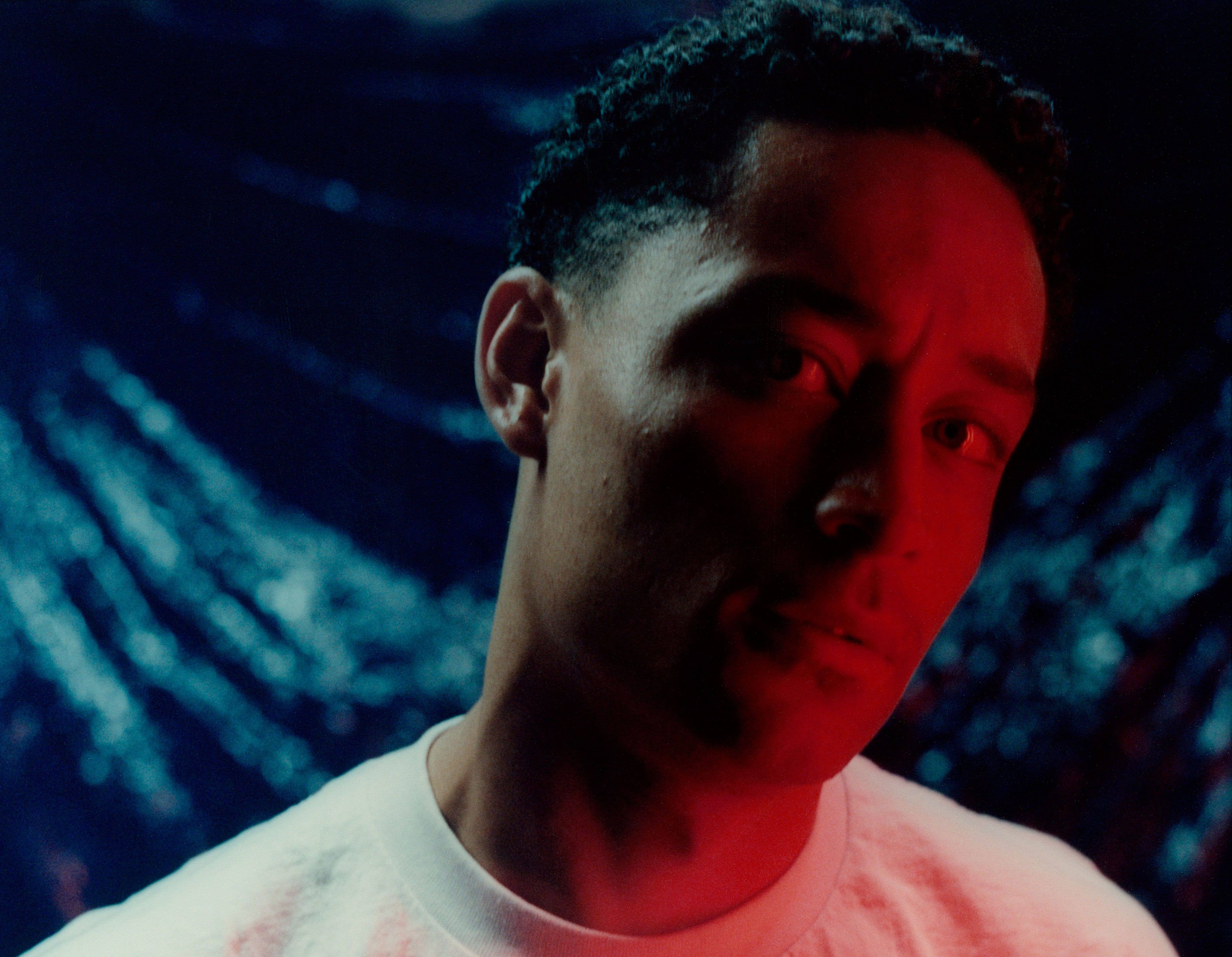
Loyle Carner was born to stand out.
Born Benjamin Gerard Coyle-Larner on National Poetry Day (Oct. 6)—to a Guyanese father and a Scottish mother, whose expertise in teaching kids with learning difficulties helped him navigate his own neurodiversity—it was inevitable that the art created through his rap alias was going to stand out too.
Arguably a chief pioneer of the UK’s “chill-rap” sound, the South London native’s ability to nonchalantly glide over an instrumental while simultaneously delivering hard-hitting punchlines has put him in a league of his own. His previous albums, 2017’s Yesterday’s Gone and 2019’s Not Waving, But Drowning—which both reached gold-selling status—chart different points in his life, narrated with the backdrop of vibrant and alluring production. On his third studio album, Hugo, Loyle tackles a subject that is rarely touched upon in the bravado-filled genre of rap: the absence of fathers. Across the 10-track project, he opens up about the difficulties he faced growing up—as a mixed-race man—not having his Black father around. But, he says, at the heart of it, Hugo “is all about forgiveness.”
“What a relief it was for me to unburden myself again—my homies, my friends, my guys and girls—from holding on to this deep pain of not having someone in your life,” he tells me. “Because all it’s doing is messing you up. I had this chip on my shoulder based on my resentment towards my dad. I realised that I always saw my dad as flawed, and I always saw myself as perfect. But when I had my son, I initially saw myself as a perfect father, but then I realised that this just wasn’t the case. I’m flawed and I made mistakes, too. I let my girlfriend down, and I’ve also let my son down at times. And it got me thinking: ‘So, if I do this or that—and I know I’m a good person—then my father’s a good person, too, right?’ It made me look at things totally different when I had my own child.”
We sat down with Loyle Carner to discuss his latest project, forgiving his father for the absence in his life growing up, becoming a father himself, Headie One being his poet laureate, and more.
“The album starts with the initial conversations with my father, which were full of hate, full of disrespect, full of fear and no understanding. And then, as the album goes on, it moves to this place of different perspectives and understanding, to the point at the end where I’m able to forgive him.”
COMPLEX: A lot has changed since you released your last album, 2019’s Not Waving, But Drowning—most notably you becoming a father. How has becoming a dad changed your perspective on life, and how has it affected the music you make now?
Loyle Carner: In many ways, I change every day, but I’ve definitely become more patient and more aware of the impact of my words—the power of words, in general. I think that when you’re young, you’re just kind of saying whatever without thinking about it and I think there’s a beauty to that, for sure. But the beauty in the next step in evolution is realising that the words you say—they last forever! What are you gonna stand for when it’s all said and done? What will you be remembered for? My son was the wake-up-call that made me think, “What do I want to leave behind for him?” I want my music to be a collection of experiences that can help guide him through life so he doesn’t make all the same mistakes I made, and to shorten some of those trips downhill. I never had a male role model or a positive male influence in my life, so to now be that person to someone else is quite a crazy thing for me. But being there for my son is really powerful, because I’m now starting to get it for myself. By being that for him, I’m also being that for myself because—subconsciously—I’m maybe giving that advice to the younger me.
It’s great that you look at it that way.
That’s a big part of therapy: the idea that, for example, if you’re scared of flying, you imagine the younger you on a plane and you tell yourself, “Turbulence is just pockets of air.” But because there really is a child, you have to be wiser and more thoughtful and more open because these words will impact how he navigates the world.
You touch on some really heavy topics on this album, and—personally speaking—some tracks cut deep. What’s your thought process when it comes to deciding what to rap about?
There are definitely times where I want to be more hedonistic, or just talk about things that are seemingly a bit more superficial, but it’s just the only way I know how to express myself. I grew up heavily into literature and poetry and plays, and I’m a big fan of older playwrights like Shakespeare and Chekhov, and also new people like Alfonso Cuarón. What I always found the most powerful was when I saw someone—similar to myself—be vulnerable. The reason I have a love for certain characters in movies, or places, is because you get to see them at their worst and you get to grow with them. There’s definitely a lot of posturing and bravado in rap music and, understandably so, because it comes from a place of such oppression.
But what I think I wanted to offer to rap music, and to young people, was that to look like me and to have all the stereotypical dress sense, culture, music, dance moves, there must still be a human. People who talk about things that I could never talk about, they still go through the same stuff I do. You need both. You need that rapper whose music makes you feel confident in the morning, but you also need that rapper you can tap into when somebody close to you passes away, or when you feel anxious. And I think that’s the beauty of it. There’s something for everyone in rap because everyone’s expressing different things.
How do you navigate being vulnerable to the world, especially in a genre like rap which many associate with big egos?
Being vulnerable to the world is scary, but I feel a responsibility because I have an ability to articulate my emotions. And in my community, growing up where I grew up, many of the guys who grew up without fathers don’t talk about how they feel but I know they do feel. I have friends who are crippled with anxiety and are self-conscious, but they don’t say it—it manifests itself in other ways. I’m basically giving a voice to all my homies that may not be able express their emotions through words at this point in time.
I don’t think the importance of storytelling through rap will ever dissipate.
Being able to tell a story through rap is incredibly important, and not just in the way that I do it. Yes, I’m a Trojan horse, because my mum is white, for one, so people see her and expect that she must be into indie music and poetry or whatever. So that’s my route to a certain pocket of people. I’m able to articulate myself in a certain way that is palatable enough for some people to go, “Oh, of course you can talk about poetry.” However, I see an artist like Headie One as just as much of a poet laureate, as much as a literary artist as anyone. I think we’d love to get to a point where these are the things that are taught in schools, because you can’t get closer to a real expression of the time than listening to someone like Headie One. If you look past the negative association with what comes with some of his music, which is to be expected, what he’s doing is expressing his reality and in a way that is truthful and authentic.
Rap can be such a powerful way of speaking to that experience of being “other”. You need someone who can articulate your feelings and for society at large; before you condemn, you should at least try to understand. It’s all about looking through the lens with compassion—everyone’s on the same thing. Just because this person has made a mistake, it doesn’t make them a bad person. In fact, the person tweeting “let’s bring him down” probably made ten mistakes that day. It starts to make you realise we need to reframe the way we’re looking at each other because it’s not just so black and white.
“You need that rapper whose music makes you feel confident in the morning, but you also need that rapper you can tap into when somebody close to you passes away, or when you feel anxious.”

On that topic of compassion, and developing a more nuanced understanding of how we view the world, on Hugo, you explore your relationship with your father in a very compelling way, putting a lot of emphasis on forgiveness. How important is it for you to reframe the narrative around issues such as growing up without a father?
Yeah, I mean, it’s essential. And that was kind of what I wanted to give back to rap. I took a lot from the genre: I got paid from it, I met all of my closest people in my life from it. Rap changed my life! It saved my life. But what I found in it, and what I fell into the trap of as well, was that perspective of harbouring hatred towards absent fathers. I get it, because that’s exactly where I was at, but after having a son myself, I had to reconnect with my father. Like myself, my son is also mixed-race; he needs to see the Black side of his heritage and that’s my responsibility. It’s also something that my dad never gave to me: an understanding of my Black lineage and my history.
Through reconnecting with my dad, it’s what this album is all about: forgiveness. And what a relief it was for me to unburden myself again—my homies, my friends, my guys and girls—from holding on to this deep pain of someone, because all it’s doing is messing you up. Everywhere I went, I had this chip on my shoulder based on my resentment towards my dad. I realised that I always saw my dad as flawed, and I always saw myself as perfect. But when I had my son, I initially saw myself as a perfect father, but then I realised that this just wasn’t the case. I’m flawed and I made mistakes, too. I let my girlfriend down, and I also let my son down at times. And it got me thinking: ‘So, if I do this or that, and I know I’m a good person, my father’s a good person, too, right?’ It made me look at things differently when I had my own child.”
In light of understanding this relationship with your father, can you tell us a bit about how the album title, Hugo, came into the picture.
The album’s called Hugo because it’s named after my father’s car. He taught me to drive over the lockdown and as we were driving around, we were having these conversations that were really beautiful because, in a car, you’re not looking at each other… The album cover is my dad’s car, so the album starts with that: the initial conversations with my father, which were full of hate, full of disrespect, full of fear and no understanding. And then, as the album goes on, it moves to this place of different perspectives and understanding, to the point at the end where I’m able to forgive him. I wasn’t going to tell anyone about this but I thought it was important to guide people, as the project raises some triggering questions—especially for people who might not have had the privilege of therapy before—so it’s important to provide some context to help frame the emotions they feel.
Who were you listening to in the background, inspiring this album’s sonic palette, as you were piecing this album together?
I was trying to listen to a lot less rap, because I was trying to write less—I was trying to say more with less. Musically, I was listening to a lot of live stuff: D’Angelo, Khruangbin, Gil-Scott Heron and also weird stuff that you wouldn’t expect, like Red Hot Chilli Peppers. I really resonated with the brand’s frontman, Anthony Kiedis; I love the way he writes because he just doesn’t care. I guess that’s part of the privilege of being, like, a white guy with long hair. He can take the influence without feeling so trapped sometimes. It encouraged me to step outside the box and think, “Okay, what happens if I sing or if it doesn’t rhyme?” Basically, I had to start trying to find some influences that weren’t coming from rap music. How can I look to someone talking about the same things but without that concern of being trapped in?
Tracks on the album feature and reference striking poems and speeches, such as Half Caste by John Agard and Malcolm X’s You Can’t Hate The Roots Of A Tree, as well as a speech by the young activist Athian Akec on knife crime. How important is it for you to explore pertinent issues on race and social issues in your music, and are there any apprehensions—especially as you have such a diverse fanbase?
I studied Malcolm X at drama school and I found that Malcolm X is as much of a poet as John Agard, and John Agard is as much of a political speaker as Malcolm X. The idea of that speech is that Malcolm X was explaining how African Americans’ negative perceptions of Africans, which was based on western perspectives, meant that they viewed Africans as less than. And he was basically saying, as long as you hold on to this hate with your origin, you will hate yourself. Athian’s speech was one that most people in my circle were aware of but I felt that it made sense to broadcast the very important message to a wider audience as I had the ability and platform to.
You touch upon having ADHD, and I know you’ve set up a cooking school that allows teens with ADHD to express themselves. What have you learned from your experience with the school?
So the school is for 14-16-year-olds with ADHD, which I think is very important because not only is cooking a very grounding activity, it’s important to have role models with ADHD—which is something I never had. I learned a lot from the children—the way they think—but it’s also a lot of hard work, which has reaffirmed my respect for teachers.
Going back to what you said earlier in the interview, what would young Loyle Carner tell the grown-up-father-of-one Loyle Carner today?
Young me would say to the older me: “Don’t lose the curiosity and the inner child. Create and move on. Keep your eyes open, and on the road.”



